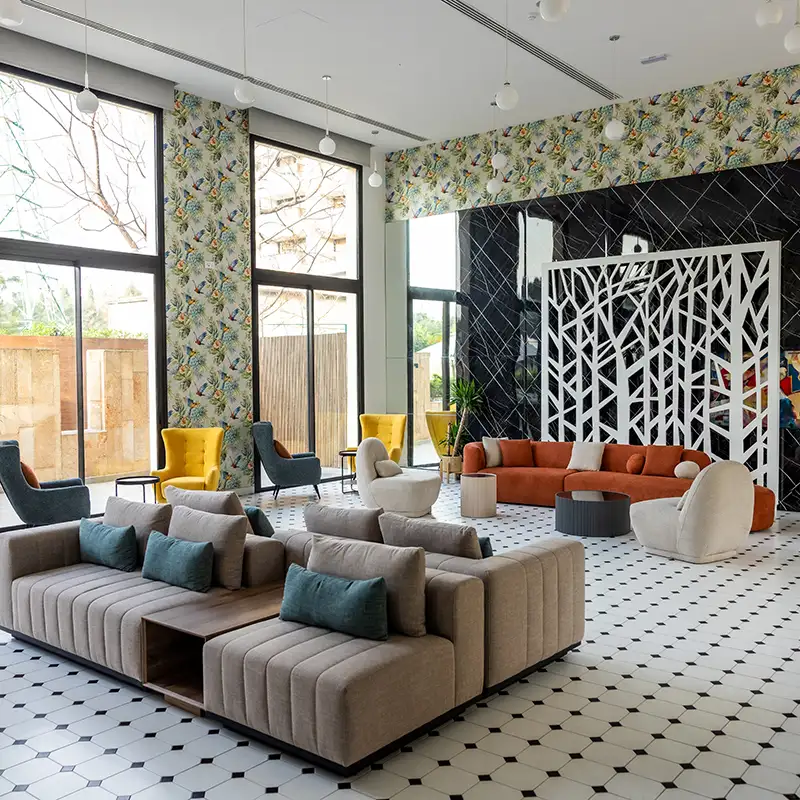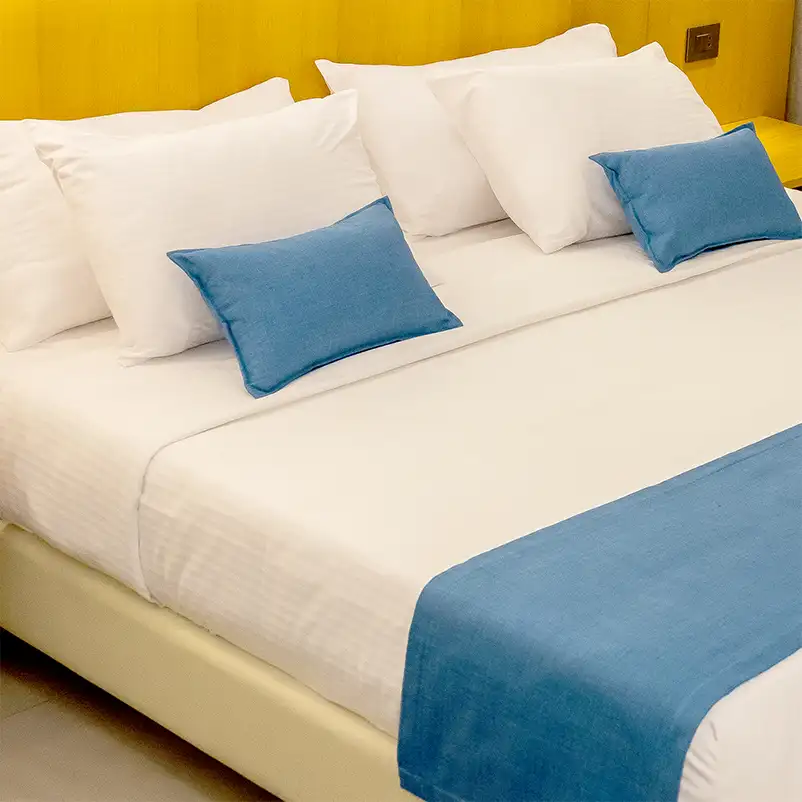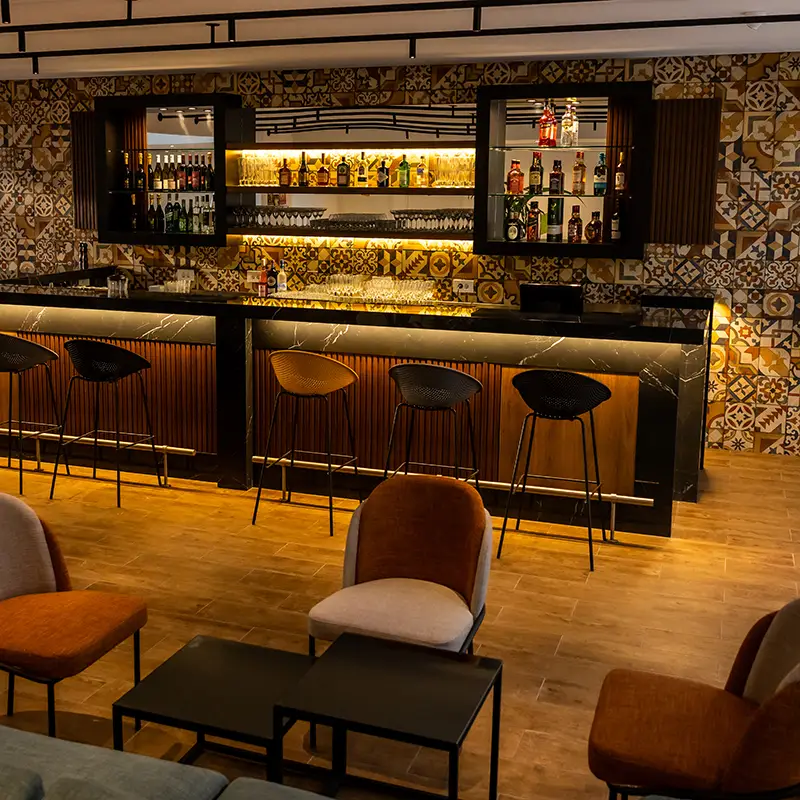About
LE GROVE HOTEL
Good to Know
In the heart of Jounieh, Le Grove Hotel pairs warm, family-run Lebanese hospitality with easy, thoughtful comforts. Whether you’re here to unwind, gather with friends, or explore the coast and mountains, you’ll find calm spaces, caring service, and everything set up to make your stay effortless.
Guest Essentials
- Check-in: 3:00 pm
- Check-out: 12:00 pm (midday)
- Breakfast: 7:00–10:30 am — a generous European & Lebanese spread with hot and cold items
- Room Service:
- Full menu available until 11:30 pm
- Sandwiches available 11:30 pm–6:00 am
- Bar: 24-hour service (alcoholic & non-alcoholic beverages)
- Shisha: 24 hours on the outdoor terrace only
- Swimming Pool: 8:00 am–8:00 pm
- Parking: Free on Basement 1 & Basement 2 (≈ 35 cars)
- Wi-Fi: Free high-speed Wi-Fi throughout the hote
Bloom & Co — Eat, Sip, Gather
- Indoor seating: 56 covers
- Outdoor seating: 70 covers
- European-inspired comfort dishes (burgers, pizzas, sandwiches, salads), handcrafted cocktails, and desserts — perfect for relaxed meals from morning to evening.
Rooms & Suites (Total: 38)
- 2 Suites (~50 m²): 2 balconies, kitchenette, living room, barista espresso machine, jacuzzi bathtub
- 5 Deluxe Rooms (~40 m²): bathtub + walk-in shower, barista espresso machine; each with an adjoining Twin Room (~35 m²) option for families
- 1 Accessible Room (~40 m²): designed to accommodate wheelchair users (approx. 30-inch wheelbase)
- 16 Standard Rooms (~35 m²)
- 14 Twin Rooms (~35 m²)
All rooms include: a private balcony with panoramic views (balcony table + 2 chairs), 40″ Smart TV, and essential comforts.
Fitness & Wellness
- Gym equipment: 1× treadmill, 1× rower, 1× stationary bike, 1× elliptical trainer, 1× weight bench, 1× multigym, 1× ab bench.
Meetings & Events
- Conference Room: 14-seat capacity with an 80″ Samsung Smart TV — ideal for briefings, board meetings, and private presentations.
A Brief History of Jounieh
Jounieh (جونية) is a coastal gem just north of Beirut, whose roots stretch back to the Phoenician era when it served as a maritime trading post. In the 19th and early 20th centuries, Jounieh thrived with silk factories, shops, and maritime trade, connected by road (15km) to Beirut and beyond. With the arrival of the Téléphérique cable car in 1965,
linking the bay of Jounieh to the shrine of Our Lady of Lebanon in Harissa at 650 meters elevation, the city gained a symbolic architectural and spiritual landmark that draws visitors for its dramatic vistas. Through periods of war and renewal, Jounieh transformed from a quiet trade town into a vibrant coastal city celebrated for its blend of sea, mountain, gardens, and culture.
Today it’s known for its scenic coastline, historic souks, lively nightlife, and as a center of Lebanese heritage and hospitality. Jounieh is a coastal city in Keserwan District, about 16 km north of Beirut, Lebanon. Since 2017, it has been the capital of Keserwan-Jbeil Governorate
The name Le Grove reflects our vision — a grove is a calm cluster of trees, a natural sanctuary where light, air, and peace flow freely. That same feeling guides every detail of our design. Open layouts invite movement and connection, allowing sunlight to dance across airy spaces and create a sense of effortless calm. Our colors and décor draw directly from nature — gentle botanical greens, sea-washed blues, and warm neutral tones — blending freshness with tranquility to help guests instantly feel at ease.
The hotel’s Franco-Italian architecture adds a graceful touch of European charm: clean lines, balanced proportions, and French-style balconies that open to panoramic views of the Mediterranean Sea, the public Jounieh Garden, and the majestic Harissa mountains. Every element — from architecture to palette — is chosen to celebrate openness, light, and harmony, creating a haven that feels both timeless and welcoming.
The Story of Jounieh
Phoenician Era (c. 1200 BC – 300 BC)
- Origins as a coastal settlement and trading post along the Mediterranean.
- Part of the maritime network of the ancient Phoenicians, known for seafaring and commerce.
,
Roman & Byzantine Periods (64 BC – 7th Century)
- Integrated into the Roman province of Phoenicia; port used for trade and fishing.
- Early Christian influence established small communities and churches along the coast.
Medieval Era (7th – 15th Century)
- Recognized by Arab geographers as a sea fortress.
- Served as a coastal link between Beirut and Byblos during Crusader and Mamluk periods.
19th Century – The Silk Coast
- Became a bustling trade town with silk factories, local markets, and merchant homes.
- Connection to Beirut strengthened via railway and coastal road.
- Growth of Maronite communities and early architecture along the bay.
Early 20th Century – Modern Beginnings
- Expansion of maritime trade, fishing, and small industries.
- Rise of family-run guesthouses and community churches.
1965 – The Téléphérique
- Launch of the iconic cable car linking Jounieh Bay to Our Lady of Lebanon in Harissa (650 m elevation).
- Became a symbol of faith and panoramic beauty, attracting visitors worldwide.
1970s – Golden Era of Leisure
- Jounieh emerges as a vibrant seaside resort, with marinas, beach clubs, and nightlife.
- Blends sea, mountain, and culture — a coastal haven of Lebanese joie de vivre.
1975–1990 – Years of Challenge
- The Lebanese Civil War affects the region, yet Jounieh remains a center of resilience and community.
2000s – Renewal & Growth
- Urban revitalization, new hotels, restaurants, and tourism facilities.
- Recognized as a gateway city between Beirut and Mount Lebanon.
Today – A Coastal Gem
- A city where sea, garden, and mountain meet.
- Celebrated for Lebanese hospitality, panoramic views, and a blend of heritage and modern comfort.
- Home to Le Grove Hotel, a sanctuary of calm in the heart of Jounieh.
HOTEL FACILITIES
Hotel Services & Amenities
01
Services
- Laundry
- Breakfast available
- Swimming Pool
- gym
- Bar

02
Reception
- Mon - Fry 09:00 12:00
- Sat - Sun 14:00 18:00
- Room Service 11 - 18

03
Booking
- reservations@legrovehotel.com
- +961 (0)9 642 842
- Labanon, Jounieh

